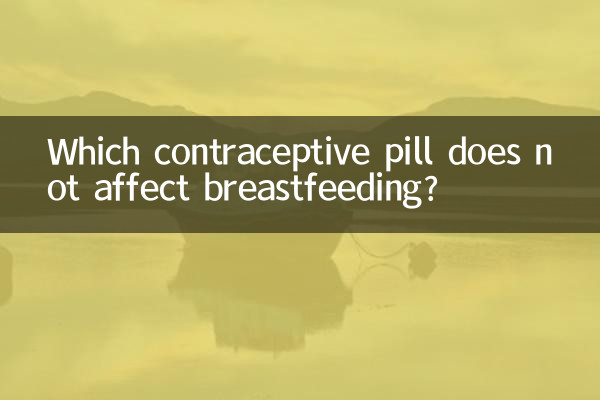What birth control pills don't affect breastfeeding? A complete analysis of contraceptive methods during lactation
When breastfeeding mothers choose a contraceptive method, they must not only consider the contraceptive effect, but also ensure that it does not affect breastfeeding. The following is a detailed guide on safe contraception during breastfeeding, compiled based on hot topics and scientific advice from the entire Internet in the past 10 days.
1. Key principles of contraception during lactation

1. Prefer estrogen-free contraceptives (progestin-only contraceptives)
2. Avoid using contraceptive methods that may reduce milk production
3. Hormonal contraception can only be started after 21 days after delivery.
4. The best contraceptive effect requires the correct use method
| contraceptive methods | Does it affect breastfeeding | effectiveness | Things to note |
|---|---|---|---|
| Progestin-only contraceptive pill (mini pill) | does not affect | 91-99% | Need to be taken at a fixed time every day |
| Condoms | Doesn't affect at all | 85-98% | Need to be used correctly |
| Intrauterine device (copper or progestin-containing) | does not affect | 99% | Need to be placed by a professional doctor |
| Contraceptive injection (medroxyprogesterone acetate) | May have a slight impact | 94-99% | Injection every 3 months |
| Contraceptive patch/combined contraceptive pill | Affect milk volume | 91-99% | Not recommended during lactation |
2. Pure progestogen contraceptives available during lactation
The following are clinically proven contraceptive brands that do not affect breastfeeding (specific use requires medical advice):
| Drug name | Main ingredients | How to take | Things to note |
|---|---|---|---|
| Cerazette | desogestrel | 1 tablet per day | Best to take at the same time |
| Micronor | norethindrone | 1 tablet per day | If you miss it, you need to make up the dose |
| Nor-QD | norethindrone | 1 tablet per day | Starting 6 weeks after delivery |
3. Popular questions and answers: Frequently asked questions about contraception during lactation
Q1: Will taking birth control pills during breastfeeding affect my baby?
Progesterone-only contraceptive pills (mini-contraceptive pills) will not affect your baby's health through breast milk and are clearly recommended by WHO.
Q2: When should I start contraception?
It is not recommended to use hormonal contraception within 21 days after delivery. Although natural breastfeeding has a certain contraceptive effect (lactational amenorrhea method), ovulation may resume 6 weeks after delivery. It is recommended to plan a contraceptive plan in advance.
Q3: Will birth control pills affect milk production?
Contraceptive pills containing estrogen will reduce milk production, while pure progestin contraceptive pills usually do not affect milk secretion, but some mothers report that milk production increases.
4. Breastfeeding contraceptive options recommended by experts
1.0-6 weeks postpartum:Condom + lactation amenorrhea method (3 conditions need to be fully met)
2.After 6 weeks postpartum:Pure progestogen contraceptive + condom dual protection
3.Long term plan:Progestogen-containing IUD (such as Mirena)
5. Real feedback from users
| platform | User reviews | use product |
|---|---|---|
| mom network | "I have been using Cerazette during lactation, and my milk volume is normal and my baby is healthy." | Cerazette |
| baby tree | "I wore the Mirena ring 3 months after delivery, and there was no discomfort at all." | Mirena IUD |
| Zhihu | "Pure progesterone pills need to be taken strictly on time. If you miss the time, there will be some bleeding." | Micronor |
6. Precautions
1. All contraceptive pills must be used under the guidance of a doctor
2. If abnormal bleeding, breast swelling and pain occur, you should seek medical treatment promptly.
3. Contraceptive effect is closely related to correct use
4. Weight changes during lactation may affect contraceptive effectiveness, so regular review is recommended.
Final reminder: Every mother’s physical condition is different. It is recommended to consult an obstetrician and gynecologist to choose the most suitable contraceptive plan, and to conduct regular postpartum check-ups to ensure the health of mother and baby.

check the details

check the details